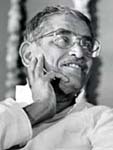Applause and abuse as Athavale is awarded the Templeton prize
Amberish K Diwanji in London
 "The award is only a small measure towards recognising Dadaji," said
Suresh Chauhan, after Pandurang Shastri Athavale received the
Templeton award on May 6. "It will, however, give him the
recognition that he deserves," he added.
"The award is only a small measure towards recognising Dadaji," said
Suresh Chauhan, after Pandurang Shastri Athavale received the
Templeton award on May 6. "It will, however, give him the
recognition that he deserves," he added.
Swadhyayees are pleased that the award went to Athavale, whom they all
refer to as Dadaji. The Swadhyaya `family' is widespread in the United
Kingdom, primarily among the Gujaratis and Maharashtrians, but also
includes others of Indian-origin.
For most Indians abroad, Swadhyaya was a basis to find their
roots and cultural attachment to Hinduism and India. "Swadhyaya helped
me find my identity and understand myself, besides bringing me in
contact with people of my community," said Shirish Joshi, 41, who has
been associated with the group since his early twenties.
Joshi was born in Mombassa, east Africa, and has only been to India on
visits. His family shifted to the United Kingdom before he turned five.
"When I was young, my exposure to India and Indian culture was
extremely limited. As a teen, I rebelled against the ritualism of
Hinduism. But after coming into contact with the Swadhyaya, I began to
understand my religion better and saw the reasons behind the rituals," he says.
Swadhyaya began in Britain in 1978. Its adherents meet
every Sunday, where prayers are sung and a videotape of Athavale is
played. For Mita Patel, these prayer meetings give her a homely
community feeling. Mita, who is 28 years old, began attending the
Swadhyaya session after coming to Britain 10 years ago.
"Swadhyaya applies religious philosophy and helps you become a better
individual," she said. She said she did not miss India as she
was closely associated with the Indian community in the United
Kingdom.
Unlike Mita Patel, her sister-in-law, Archana Patel, 23, has little
linkage to India. She was born in East Africa and has been in the UK for
most of her life. "Dadaji showed how religious rituals play a role in
devotion. Through Swadhyaya, one's character progresses, and it
also gave me an insight into the golden age of Hindu culture."
Not all are happy. Outside Westminster Abbey, where Dadaji received
the award, a small group of men staged a
protest, accusing Athavale of being backward and brahmanical in his
thinking. Their leaflets claimed Athavale had said in his book
Sanskritic Chintan (Cultural Thoughts) that he supported the caste
system, did not consider slavery as evil, and felt that girls should
be married within three years of reaching puberty.
"How can the Templeton Foundation give an award to such a person?"
asked Krishna Ghamre who is leading the demonstration under the
auspices of the Ambedkar Centre for Justice. Ghamre pointed out that
Athavale's teachings have never condemned the caste system and its
inherent evils. "In fact, Athavale has said that everyone should
follow their own profession or else it creates trouble," he added.
Unfortunately for the demonstrators, Athavale used another entrance; the
guests, which included Indian High Commissioner Dr L M Singhvi, Srichand
Hinduja and scores of the Swadhyayees, used the imposing main
entrance. The demonstrators dispersed after some time. London was
experiencing unseasonal wintry conditions and there were few who could
withstand the bitter cold wind.
Medha Shah, on a holiday in London, hails from Bombay where she is an
avid Swadhyaya follower. Asked about the demonstration, she said,
"There will always be some people who will object. Many of Dadaji's
followers are the so-called lower caste people like the fisherfolk."
Another Swadhyayee, Paresh Goel, said they did not believe
in untouchability. "A central tenet of Dadaji's teaching is that
there is God in every person, so how can we believe in high and low?"
The teachings of Swadhyaya fulfill a cultural and religious need of
the Hindus cast asunder in the Christian West. "For many older
people who went to the West to make money, Swadhyaya helped give
their children a semblance of Hindu traditions, and helped bring the
community together," said Dr R K Srivastav, a fellow at the Centre
for the Study of Developing Societies, New Delhi, who has been
studying the Swadhyaya movement since 1986.
Srivastav said the Swadhyaya movement has been most active in Gujarat
among many of the so-called lower castes. He put the number of
Swadhyayees worldwide at about 2 million.
Asked to explain what being a Swadhyayee meant, Shirish Joshi replied,
"It is about the brotherhood of man under the fatherhood of God."
|





